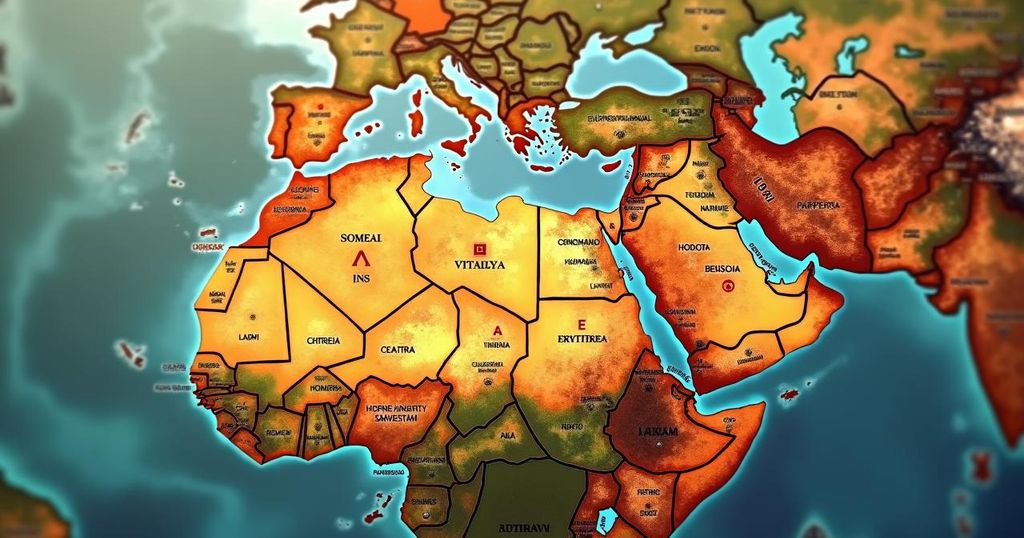Egypt Reinforces Its Regional Influence in the Horn of Africa Through Alliances with Somalia and Eritrea
Egypt is enhancing its presence in the Horn of Africa through strategic alliances with Somalia and Eritrea, aiming to counter Ethiopia’s influence. This initiative was underscored by a recent summit in Asmara, convening leaders from the involved nations. Amidst escalating regional tensions and allegations of Egyptian military involvement in Sudan, Cairo seeks to reaffirm its role as a significant regional actor, although this has spurred strong reactions from Ethiopia.
In recent developments, Egypt is significantly enhancing its influence in the Horn of Africa through strategic alliances with Somalia and Eritrea. This diplomatic endeavor was highlighted during a tripartite summit in Asmara, attended by Egyptian President Abdel Fattah Al-Sisi and the leaders of Eritrea and Somalia, Isaias Afwerki and Hassan Sheikh Mohamud, respectively. The primary aim of this alliance appears to be the establishment of a bloc to counter Ethiopia’s regional dominance. This summit was particularly noteworthy as it followed allegations from Sudanese Rapid Support Forces’ commander, Mohamed Hamdan Dagalo, who accused Egypt of directly bombing his forces amid the ongoing conflict in Sudan. Such accusations reflect Egypt’s decision to shift from a previously neutral stance to an overt military role in the region, underlining its commitment to protecting its national interests. While the Eritrean Ministry of Information framed the discussions as focusing on strengthening trilateral relations and addressing regional security issues, the underlying motivation seems to be a collaborative effort to confront Ethiopia. Tensions have escalated further as military collaborations between Egypt and Somalia deepen, coinciding with Ethiopia’s agreements with the Somaliland region concerning port access in the strategic southern Red Sea area. During this summit, the Egyptian presidency emphasized that the visit was intended to bolster bilateral relations and support regional developmental goals. However, Ethiopian Prime Minister Abiy Ahmed has voiced strong opposition to what he perceives as encroachments on Ethiopia’s sovereignty, asserting, “We will not allow them to harm us; we will humiliate anyone who dares to threaten us.” Ahmed further emphasized his unwillingness to negotiate regarding Ethiopia’s dignity and independence. Egypt’s involvement in regional conflicts, such as in Sudan, indicates its desire to reaffirm its significant role on the African continent. While portraying itself as a supporter of Sudanese stability, military actions reportedly involving Egyptian weaponry have raised questions about Egypt’s true intentions. Despite denials of direct involvement, experts note that continued conflict could have dire consequences for Egypt itself, prompting the nation to seek stable solutions in its neighboring countries. Moreover, Sudanese political analyst Mohamed Torshin opined that Egypt aims to counter any armed groups outside state institutions, recognizing the security ramifications for its own national safety. Ongoing military and diplomatic maneuvers in the Horn of Africa suggest Egypt’s attempt to solidify its position in a highly contested regional landscape, one marked by the interplay of alliances and geopolitical rivalries. Ultimately, Egypt’s recent actions reflect its strategic pivot towards a more interventionist foreign policy aimed at safeguarding national interests while navigating complex regional tensions.
The Horn of Africa has been a focal point of geopolitical dynamics, particularly due to its proximity to vital shipping routes and the competition for influence among regional powers. Recently, Egypt has sought to augment its presence in the region through diplomatic alliances with Somalia and Eritrea in response to Ethiopia’s growing influence following its agreements with Somaliland over strategic ports. The ongoing conflict in Sudan has further complicated these dynamics, as Egypt navigates its role amidst various actors in regional instability.
In summary, Egypt’s recent summit with Eritrea and Somalia marks a significant step toward strengthening regional alliances aimed at countering Ethiopia. While ostensibly focused on cooperation and stability, the assembly signals deeper strategic maneuvers as Egypt asserts its influence in a region fraught with tensions, particularly amidst its military involvement in Sudan. As Egypt endeavors to solidify its role as a key player in Africa, it must consider the broader implications of its regional interventions and the responses they elicit from neighboring states.
Original Source: www.atalayar.com




Post Comment